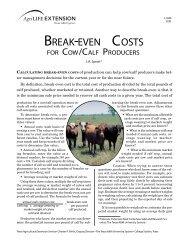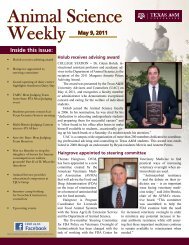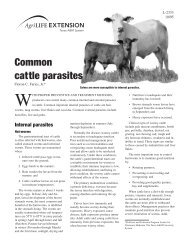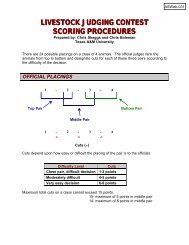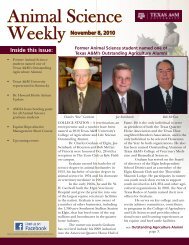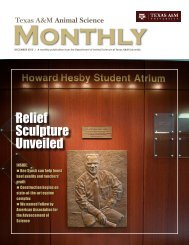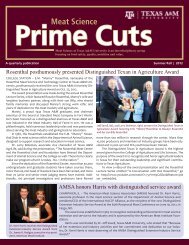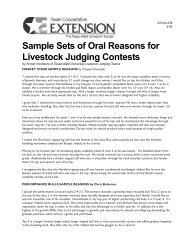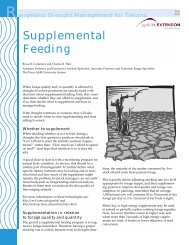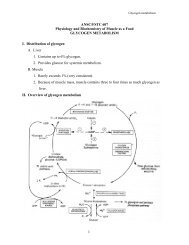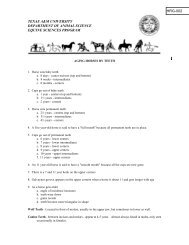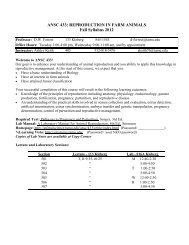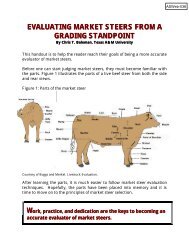Prime Cuts Summer 2011 - Department of Animal Science - Texas ...
Prime Cuts Summer 2011 - Department of Animal Science - Texas ...
Prime Cuts Summer 2011 - Department of Animal Science - Texas ...
Create successful ePaper yourself
Turn your PDF publications into a flip-book with our unique Google optimized e-Paper software.
Researching the Perfect Steak<br />
Aroma, taste evaluated by <strong>Texas</strong> AgriLife Research scientist<br />
COLLEGE STATION – Both taste and aroma are key factors one<br />
meat scientist is using to learn more about producing a better<br />
tasting steak.<br />
Dr. Chris Kerth, a <strong>Texas</strong> AgriLife Research meat scientist and<br />
associate pr<strong>of</strong>essor in the <strong>Department</strong> <strong>of</strong> <strong>Animal</strong> <strong>Science</strong> at <strong>Texas</strong><br />
A&M University, is using AromaTrax technology in his laboratory<br />
to evaluate both aroma and flavor.<br />
“We analyze all methods <strong>of</strong> sensory (input) using taste and<br />
aroma,” said Kerth, who was recently featured on National Public<br />
Radio’s <strong>Science</strong> Friday broadcast from San Antonio. Kerth<br />
also presented his research at the <strong>Texas</strong> A&M Beef Cattle Short<br />
Course in College Station, sponsored by the <strong>Texas</strong> AgriLife Extension<br />
Service.<br />
AromaTrax uses gas chromatography/mass spectrometry<br />
coupled with a human “sniff port” to separate volatile compounds<br />
in the air around the hot, cooked sample, he said.<br />
“Part <strong>of</strong> the sample goes to the machine that identifies the<br />
chemical compound, while a person sits at the sniff port and<br />
smells each <strong>of</strong> the compounds,” he said.<br />
When they detect an odor, they click on a computer screen<br />
to match the aroma and intensity.<br />
“The computer then matches the chemical compound to the<br />
aroma and intensity,” Kerth said. This allows an aroma/sensory<br />
pr<strong>of</strong>ile to be developed for each product.<br />
“Since each <strong>of</strong> the fatty acids and other meat components<br />
serve as precursors to the volatile compounds that we smell and<br />
taste, a direct link can be made between the sensory trait and the<br />
actual chemical compounds in the meat,” Kerth said.<br />
The proprietary s<strong>of</strong>tware, coupled with the powerful chemical<br />
identification capability <strong>of</strong> the machine, “is a great tool to describe<br />
flavor and aroma pr<strong>of</strong>iles,” Kerth said.<br />
Some <strong>of</strong> his research objectives are to determine the effect<br />
<strong>of</strong> diet (forage, distillers grain) on flavor, optimum temperature<br />
for grilling particular beef cuts, if flavor is increased by altering<br />
cooking methodology, optimum conditions for aging beef, and<br />
optimizing genetics and developing a strategy to enhance beef’s<br />
greatest asset — its flavor, he said.<br />
Page <strong>Prime</strong> 4 | <strong>Prime</strong> <strong>Cuts</strong> | <strong>Cuts</strong> Page 2<br />
Kerth’s research may branch out beyond meat science, he<br />
said, possibly using the lab to research other food products in the<br />
future.<br />
“We can use the machine to evaluate virtually every volatile<br />
chemical compound in food to see what are the most valuable<br />
traits,” he said. “It’s exciting technology that we hope to use to<br />
create more value for food products in the future.”<br />
Kerth serves as expert panelist on<br />
National Public Radio science program<br />
SAN ANTONIO -- Dr. Chris<br />
Kerth, associate pr<strong>of</strong>essor<br />
<strong>of</strong> meat science and muscle<br />
biology in the <strong>Department</strong><br />
<strong>of</strong> <strong>Animal</strong> <strong>Science</strong>, served<br />
as a guest panelist on <strong>Science</strong><br />
Friday, a national radio<br />
talk show broadcast live on<br />
National Public Radio July 8,<br />
<strong>2011</strong> from San Antonio.<br />
Kerth, along with two<br />
other expert panelists, were<br />
invited to the show to discuss<br />
“Using <strong>Science</strong> to Raise<br />
the Perfect Porterhouse” with host <strong>of</strong> the show Ira Flatow.<br />
The 40-minute discussion included talk on producing the perfect<br />
steak, from how genes affect tenderness and marbling to<br />
how grass and grain affect the type <strong>of</strong> fat in a cut <strong>of</strong> beef.<br />
<strong>Science</strong> Friday is a weekly science talk show broadcast live<br />
over public radio stations nationwide as part <strong>of</strong> NPR’s “Talk <strong>of</strong><br />
the Nation” programming. Each week, the host and his expert<br />
panelists focus on current scientific topics and present an educated,<br />
balanced discussion on the topic.<br />
To listen to the July 8 show, please go to http://www.sciencefriday.com/program/archives/<strong>2011</strong>07081.<br />
Meat <strong>Science</strong> students presented Bob Ondrusek Scholarship at annual convention<br />
SAN ANTONIO -- Seven <strong>Texas</strong> A&M University<br />
meat science students received<br />
a Bob Ondrusek Memorial Scholarship<br />
given by the Southwest Meat Association<br />
Foundation, presented during<br />
the SMA Annual Convention held in<br />
San Antonio July 21-24, <strong>2011</strong>. The SMA<br />
Foundation awarded approximately<br />
$25,000 in Ondrusek Scholarships, the<br />
largest amount ever awarded. In addition,<br />
each recipient was given a travel<br />
stipend to assist with expenses. The<br />
students were recognized during the annual President’s Dinner and Dance.<br />
Those receiving scholarships from <strong>Texas</strong> A&M are (front, left) Leslie Frenzel, Rachel<br />
Glascock, Jim Ondrusek, Bob Ondrusek’s son and Vice-President <strong>of</strong> Columbia Packing<br />
Company, Ashley Haneklaus and Haley Grimes. (Back, left) Gatlan Gray, Russell McKeith<br />
and Amanda Smith.<br />
Also at the convention, Jessica Steger,<br />
a senior animal science major, and Cody<br />
Labus, right, a meat science graduate<br />
student, were recognized as recipients<br />
<strong>of</strong> the SmiKids Scholarships, an award<br />
they each received in the spring during<br />
the Saddle and Sirloin Club Banquet.



